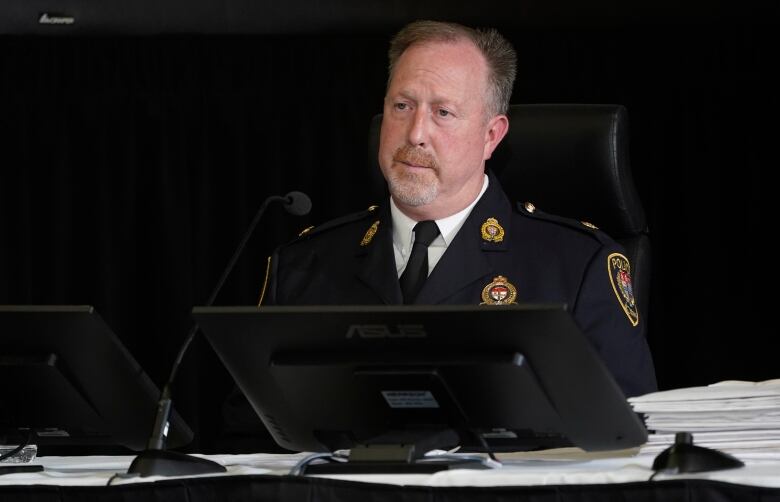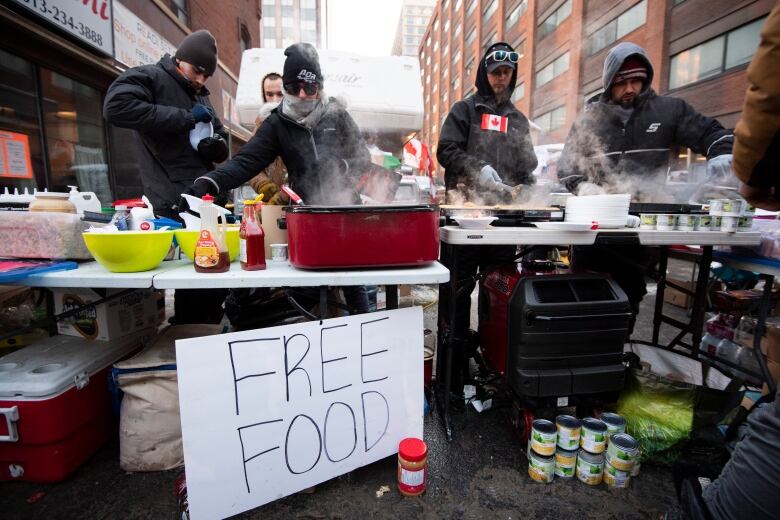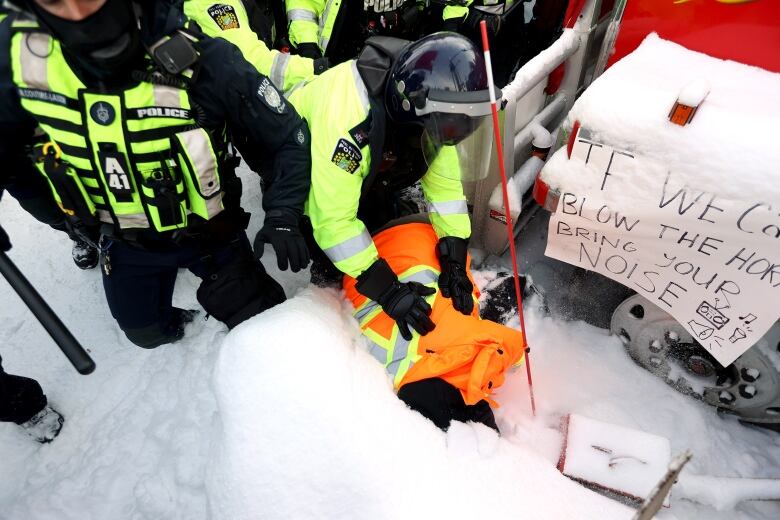Police needed Emergencies Act after deal to secure tow trucks fell through, federal lawyer says
Previous police testimony suggested 34 trucks had been secured before act was invoked
A deal with police to secure tow trucks to clear last winter's convoy protestfell through and the Emergencies Act was neededto commandeer those services,a lawyer acting for the federal government toldthe Public Order Commission inquiryWednesday.
The commission tasked with determining whether the federal government was justified in deploying the Emergencies Act to end the convoy protest has been hearing about the plans Ottawa police, the Ontario Provincial Police and the RCMP had in place to controlcrowds andclearthe protesters and their vehicles after theyhad gridlocked Ottawa for weeks.
Supt. Robert Bernier, who took over as event commander on Feb. 10. and wasresponsible for strategic operational planning for the event, told the inquiryhe did not need to rely on powers granted under the federal act to secure tow trucks.
But an exchange at the inquiry hearing on Wednesday offered a different view.
Some of those towing companies feared they would be targeted by protest supporters. At least one Ottawa tow truck operatorreported receiving hundreds of calls including death threats.
Bernier said the OPP had been able to secure 34 tow trucks with willing drivers by roughly Feb. 13 as part of their plan to end the protest.
Police had promised to place police crests on the trucks, and to cover other company markings, to keep the drivers and their employers anonymous, he said.
Federal powers did compel tow trucks: lawyer
During cross examination, Donnaree Nygard, a lawyer for the federal government, asked Bernier if he was aware that the commitment for 34 trucks fell through.
"I was not informed of that," said Bernier.
Nygard entered into the record a Feb. 17 letter that showed OPP Commissioner Tom Carrique cited the Emergencies Act in his communications withtowing companies.

"This is new to me," Bernier said Wednesday.
In a Feb. 22letter written after police hadmoved to clear Ottawa's streets Carriquetold Ontario's Deputy Solicitor General Mario Di Tommasothatthe towing industry was "highly reluctant" to assist police and that they were seeking "an unusually broad and high risk indemnification from the province for loss and damage."
That request includedindemnification forfuture retaliation.Carriquesaid that would requirethe finance minister's approval and would taketime.
WATCH |'I was not aware of that' -- OPP Superintendent Robert Bernier discusses efforts to get tow trucks to clear out truck convoy
In the letter, entered into evidence on Wednesday, Carriquealso said securing agreements with tow truck companieswould have required separate agreements.
Again, the head OPP officer warned that therewas not enough time before the planned police operation.
Carrique is scheduled to testify before the commission on Thursday.
Berniernot sure the act was necessary
In a interview with the commission before his testimony,Bernier called the Emergencies Act measures helpful but said he was already planning to carry out a police operation whenthe law was invoked.
On Wednesday, commission lawyer Frank Au asked whether he thought the federal act was necessary to remove protesters.
"Hard for me to say. I did not get to do the operation without it," Bernier responded.
"I don't know what complications I would have had had it not been in place and utilized the common law."
Bernier told the commission this summer that the powers granted under the Emergencies Act helped police adopt "a much stronger posture at exclusion zone checkpoints," and helped them execute the plan with less pressure from the crowds, according to his witness interview.
Protesters were 'prepared to defend themselves:' report
An Ontario Provincial Police report from Feb. 14, the day the government invoked the act, described a volatile situation.
"Blockade organizers view the standoff with the government as a zero-sum game: they are convinced that if the government has not reached out to them to negotiate, it is because a massive police deployment against them is imminent," said the report, entered into evidence Wednesday.
"This perception is feeding a siege mentality in which they are prepared to defend themselves."
The report mused the reported increase inbear spray sales may be indicative of that.
The OPP also wrote that it did not appear protesters would leave on their own.
"Owing to the scope, nature of the conflict, and duration of the Ottawa Freedom Convoy occupation there is no clear pathway toward reaching a satisfactory resolution that would see the protest group voluntarily end their action and depart the Ottawa area," it said.
During her cross examination, Nygard pointed to a sectionwhich saidpolice were aware that a protester "may have brought firearms."

The report also said police observations had not been able to to qualify if any truckers were in fact armed.
Bernier said he agreed there were violent elements in the crowds.
Before the act was invoked, Bernier had been working on a plan to restore public order and tow vehicles that were blocking streets.
By that point, the Ontario government had declared a state of emergency. Bernier testified that his plan did not rely on powers granted by the provincial government.
Bernier was frustrated with Sloly
Around this time,Bernier said, he tried to distance himself from Ottawa's police chief, Peter Sloly, so that he would have space to come up with an operational plan and make decisions. He said Sloly was acting behind the scenes to direct operations, including attempts to close interprovincial bridges.
Bernier said Sloly wanted Ottawa police lawyer Christine Huneault to review his plan before he approved it.
According to a summary of an interview he gave to the commission this summer, Bernier was "frustrated by Chief Sloly's direction, which he viewed as an inappropriate interference with his role as event commander."
The superintendent suggested Sloly felt challenged by the new plan since it threw another plan Sloly had helped to craft out the window.
WATCH | 'Hard for me to say' OPS Superintendent Robert Bernier is asked whether Emergencies Act was necessary
In documents tabled at the inquiry, Sloly denied asking Huneault to approve the operational plan and holding the process up.
"[Sloly] never intended that there be any delay with the implementation of the operational plan," said a summary of interviews the former chief gave the commission over the summer.
On Feb. 14, the federal government invoked the Emergencies Act. Sloly resigned the next day.
Bernier said he did not know at the time that the act was going to be invoked or that Sloly would step down.
Ottawa police and representatives of the other police forces moved ahead with what they called the February 17 Plan. It outlined four operational phases: securing resources, slow, methodical action to end the occupation, keeping the city core free of illegal activity and returning the city to normalcy.

Bernier told the commission that, by that point, he had received all the officers that he needed to implement the plan, including multiple tactical units and SWAT teams.
"Had I not had [the Emergencies Act] in that fashion what would it have looked like? Hard for me to say," he said.
Bernier later said under cross examination that he agreed with interim chief Steve Bell when he said that Ottawa police, the OPP and the RCMP would have been able to clear the crowds without the act.
OPS planning questioned
Bernier told the inquiry Tuesday that he had read intelligence reports about the convoy drafted by the OPP under the heading Project Hendon before protesters arrived in Ottawa.
One Hendon report from Jan. 27 indicated that some protesters were planning to stay in Ottawa until their demands were met, that some hoped to force a change in government and that some held anti-government views.
Bernier said he tried to raise it with his superior.

"He told Superintendent [Robert] Drummond that there seemed to be a bizarre disconnect between the intelligence contained in the Project Hendon reports and OPS's preparations," said a summary of the interview he gave to the commission in August.
Drummond represented the Ottawa police liaison teams and the public order units during the convoy. He told the commission he does not recall anyone raising concerns.
Drummond testified before the inquiry Wednesday.
He backed up Bernier's claim that Sloly was acting outside of the normal chain of command and that it was unusual for a police chief to direct enforcement at the operational level.
With files from the Canadian Press
















_(720p).jpg)


 OFFICIAL HD MUSIC VIDEO.jpg)
.jpg)



























































































